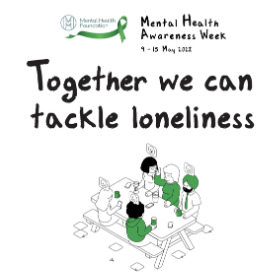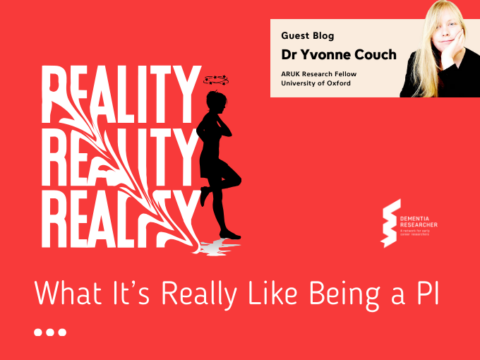It’s Mental Health Awareness Week and I thought it would be a good opportunity to talk about something that I have recently started to experience. It’s very much one of those “this is an issue I have and, by talking about it, maybe anyone else affected will find some comfort or useful advice” sort of blogs.
If any of you reading or listening to this are familiar with either my blogs or podcast works here (if not, I’m Sam… Hi!), you will know that just over a year ago I was diagnosed with a chronic digestive autoimmune (some debate this classification) condition called ulcerative colitis. Essentially, when it feels like it, my immune system attacks my digestive tract. This results in extremely debilitating symptoms and it actually landed my in hospital for 7 days at the start of this year.
When I was first diagnosed, the specialist told me lots of information about the disease. He explained the cause and symptoms and detailed the “standard” strategy with dealing with something like this. Essentially they cycle you through a load of different meds until something works. In a low percentage of cases nothing works and you require surgery but so far this doesn’t seem to be required for me. What he didn’t mention was anything about how to deal with this mentally.
A chronic illness like this is a very strange thing to have to mentally process. The likelihood of my colitis killing me is extremely low. It’s not a disease that effects your life expectancy but, when the disease is active, it has a huge impact on quality of life. You cannot leave your home, you barely sleep, your appetite vanishes and you become incredibly week and shed a frankly dangerous amount of weight. When things are back under control it takes quite a while for you to recover. These episodes are known as flares and they are the biggest cause of mental health issues in patients like me.
 Once you have gone through something like that you have a new fear to deal with. All you can remember is how sick you were and you obsess over how much you do not want that to happen again. This creates quite a severe anxiety that you have to learn to tame. Any slight deviation from feeling 100% has you panicking that you are heading into another flare… and you remember how fast that escalated last time! The issue is that this creates stress and what does stress do? It increases your risk of flaring once again. It’s something you really have to fight to stay on top of.
Once you have gone through something like that you have a new fear to deal with. All you can remember is how sick you were and you obsess over how much you do not want that to happen again. This creates quite a severe anxiety that you have to learn to tame. Any slight deviation from feeling 100% has you panicking that you are heading into another flare… and you remember how fast that escalated last time! The issue is that this creates stress and what does stress do? It increases your risk of flaring once again. It’s something you really have to fight to stay on top of.
On top of that you have the “why me” scenario. That constant wondering of “why did I get this disease?” It can take quite a toll on your mental wellbeing to not feel like a normal member of society. You can’t go out to a restaurant and eat and drink what you want without having to worry. But here’s the thing… there is something positive to take from these feelings.
Let’s start with the latter point of not feeling normal. While a chronic illness can feel like it steals a part of your life, it can also be an excuse to try and make it better. My partner encouraged me to use this as an opportunity to try and get healthier. I asked “why me” but deep down I knew the answer. Years of processed foods, poor exercise habits and bad self-care took their toll. Loads of people can keep doing that and never have a consequence like mine but I can’t. There’s nothing I can do about that but I can use it as an opportunity to better myself.
So many chronic illnesses can be alleviated by better lifestyle choices. Knowing that makes you feel empowered. Yes I did do this to myself but that means I have the power to help try and fix it. I can go out and drink 6 pints but there will be consequences. If I don’t do that, not only do I avoid symptoms I also contribute to building a healthier body. You have to recognise and believe that your chronic illness making you different is not necessarily a bad thing. The illness itself isn’t great but you can hold the power over how much you let it affect your life. There are times when, sadly, the symptoms are too severe. On those days your disease wins. But there are so many other days when you win and you can go out and live your life. Appreciate those days and live in those moments. I’ve never been more appreciative of being able to go out for a walk or even just go to the shops. When you have a chronic illness you realise something as simple as going to Home Bargains to look at candles can really be a gift because you have had days where you couldn’t even do that. If you can change your mentality in this way, your appreciation of life goes up dramatically.
Now let’s go back to the anxiety point. This is a tricky one because it requires a much more personal approach. I am no therapist and if you desperately need help I would recommend seeking the aid of a professional. You might even be able to find therapists who specialise in helping people deal with your illness. However, I would like to tell you that this can be conquered as well. So called flare anxiety has plagued me since I had my first severe episode last summer. I would question every slight movement in my stomach and over analyse every bathroom visit. It took a while but I eventually found what works for me and it’s so simple. I am normal when I am not flaring. It’s like I don’t even have colitis. I eat well and exercise (I definitely recommend exercise to reduce anxiety). I also take my medicines as advised but other than that I carry on as if I am normal. I don’t need to examine my toilet visits because, if I’m flaring, I will certainly know without having to do that. I realised that my anxiety had me living in fear and that would only make things worse. I could get sick again. I could end up back in hospital. What good is worrying about that going to do? I’d rather live my life and if I end up back on a ward, at least I enjoyed the times between.
I guess what I’m trying to say is I find living in the moment as much as possible works for me. You never know what is round the corner. All you have is right now. This immediate moment. Nothing else matters more than that so make the most of it and enjoy it. You control your illness. Your illness does not control you.

Dr Sam Moxon
Author
Dr Sam Moxon is a biomaterials scientist at the University of Manchester. His expertise falls on the interface between biology and engineering. His PhD focussed on regenerative medicine and he now works on trying to develop 3D bioprinting techniques with human stem cells, so that we better understand and treat degenerative diseases. Outside of the lab he hikes through the Lake District and is an expert on all things Disney.

 Print This Post
Print This Post




